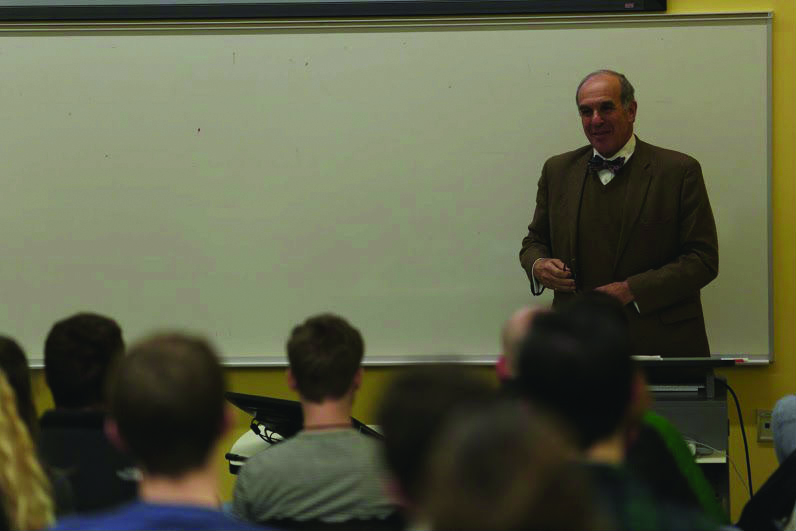
Professor Sandy Maisel of Colby College took part in the first Cohen Lecture of the spring semester on Feb. 11. This lecture titled “Two Days After New Hampshire: What Do We Know About the 2016 Presidential Election?” urged the predominantly young audience to take the presidential election seriously.
“The presidential election is serious business and should be treated that way,” Maisel said. “We are electing a president, not a cheerleader.”
Professor Richard Powell, the Director of the Cohen Institute for Leadership and Public Service, explained that having people like Maisel speak at the University of Maine is important.
“What we’re trying do with these lectures is bring interesting people to campus to speak on timely issues so that they can help people on campus understand and think about issues that are important,” Powell said.
Maisel, a professor of government and chair of the government department at Colby, is a practiced political scientist who graduated with an A.B. from Harvard and a Ph.D. from Columbia. The goal of his lecture was not only to inform about the candidates and how they are currently doing, but also to point out the importance of the election process and how it works.
Topics discussed included the differences between primaries and caucuses, the “invisible primary,” the winnowing of candidates, the importance of the election calendar, the differences between Republican and Democratic campaigns and strategies utilized by different candidates.
Maisel also explained how this election has been unlike any other. It started with 17 Republican nominees and six Democratic nominees. After two caucuses, the pool has finally been filtered to six Republican and two Democratic nominees.
According to Maisel, Senator Bernie Sanders has been able to square off against Secretary Hillary Clinton in a way no one expected. He claims that their battle is one of poetry against prose.
“Politics is like poetry. It’s gaining emotion, it’s the rhetoric,” Maisel said. “Governing is like prose. It is hard work. You go from point to point to point and it isn’t sexy.”
“It seems to me that Hillary Clinton is very good at prose, but not good at poetry,” Maisel continued. “Senator Sanders is very poetic. He may not be so good at governing.”
On the other hand, the Republican establishment has failed to focus on one candidate, making it nearly impossible to point out a front-runner. However, Maisel showed particular distaste for Donald Trump’s campaign, saying that Trump uses his own controversial comments to garner attention in order to move forward in the election.
“I think that young people today are, or at least should be, smart enough to see through that,” Maisel said.
Maisel also pointed out that Trump and Sanders are leading more than anyone thought they would and that it is nearly impossible to predict exactly what will happen after all of the surprises that have occurred so far.
The upcoming Nevada and South Carolina caucuses, followed by Super Tuesday on March 1, have the potential to clear things up, or make things more confusing. Either way, both Maisel and Powell emphasized just how important it is for students to remain informed about the election and to become an active part of it.
“These elections have very long term implications,” Powell said. “It’s extremely important for people to take a look at the candidates and very carefully assess their stance on the issues, their character, their readiness for the office and choose who they think will do the best job of leading the country.”
Powell also stated that there are a variety of ways in which students can get involved in the election process locally, on campus, and through the Cohen Institute.
“People can get involved as voters. They can get involved in the political organizations on campus,” Powell said. “We also have a large number of students who have been volunteering time to campaigns.”
The Cohen Institute also sponsors a Leadership Studies minor for students who wish to learn more about becoming proactive leaders in their communities. The Cohen Institute will also be sponsoring a May term trip to Washington D.C. For more information about the Cohen Institute, the Leadership Studies minor or the trip to D.C., visit their website.





